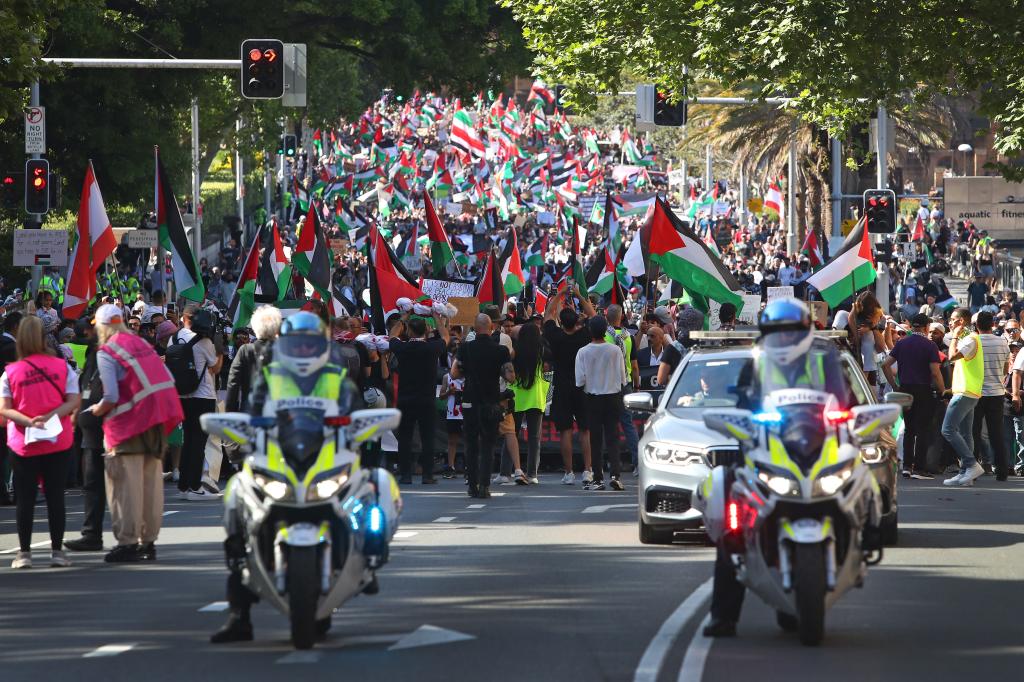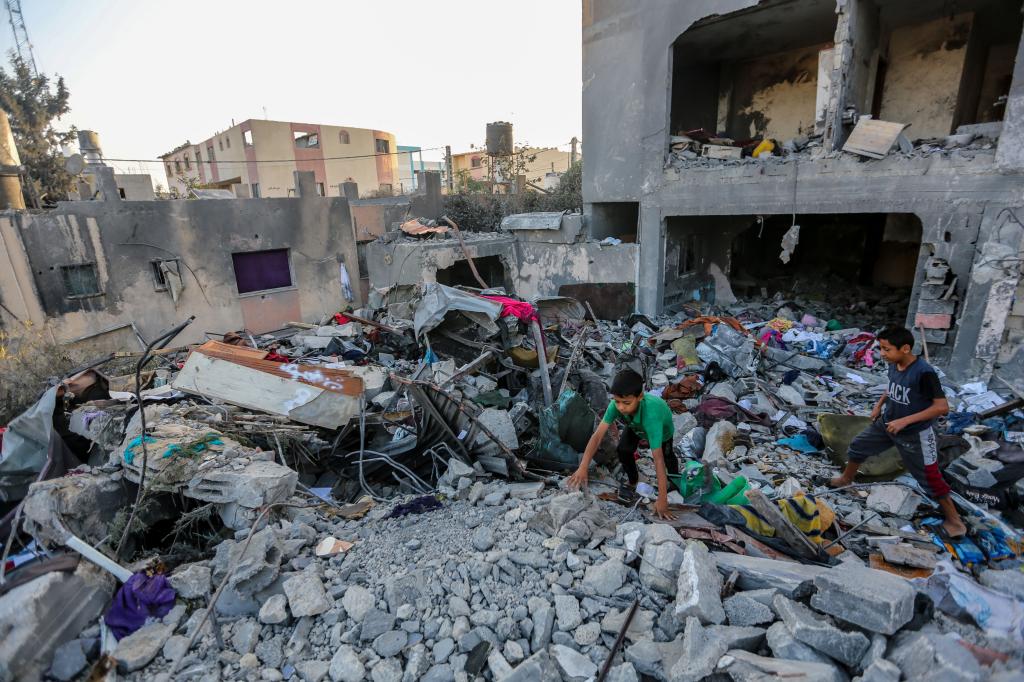
What would a ceasefire in Gaza look like? As the humanitarian situation in Gaza worsens, tens of thousands of people are calling for a ceasefire as a way to end the insurmountable human suffering. Yet both world leaders and the United Nations are disagreeing on what that ceasefire should look like or even what it should be called — and while they argue, Palestinians are dying. If you’re confused about the calls for a “ceasefire now”, you’ve come to the right place. Here’s what it means, and how you can help.
Why are people calling for a ceasefire in Gaza?
Israel’s four-week long bombardment of Gaza has left the strip decimated. As of November 6, the death toll stands at an estimated 10,000 Palestinians and 1,400 Israelis killed, although it has not been possible for media to independently verify either number. Many of those reported to be killed were citizens. Thousands were children.
“The humanitarian situation in Gaza is horrific,” UN Secretary-General António Guterres said last week, renewing his earlier calls for a ceasefire.
“Not nearly enough food, water and medicine are coming in to meet people’s needs.
“Fuel to power hospitals and water plants is running out. UNRWA shelters are at nearly four times their full capacity and are being hit in bombardments. Morgues are overflowing. Shops are empty. The sanitation situation is abysmal. We are seeing an increase in diseases and respiratory illnesses, especially among children. An entire population is traumatised. Nowhere is safe.”
Pressure for a ceasefire — or at the very least, a de-escalation in hostilities — is mounting.
Over the weekend, thousands of Australians again took to the street to march for peace. In the United States, more than 200 celebrities signed an open letter to US President Joe Biden, urging him to order a ceasefire. And last week, the UN General Assembly adopted a resolution calling for an immediate, sustained truce. It failed after 120 countries voted in favour, 14 voted against, and 45 — including Australia — abstained.
“We remain convinced that the Palestinian people are at grave risk of genocide,” a group of seven independent United Nations experts said in a statement on Thursday, per Reuters. The International Criminal Court defines genocide as the “specific intent to destroy in whole, or in part, a national, ethnic, racial or religious group by killing its members or by other means”, including bringing about its literal physical destruction.
“We demand a humanitarian ceasefire to ensure that aid reaches those who need it the most,” the experts said.
The calls have been backed by countries like Egypt and Qatar. Other western nations like the US and the UK, however, are calling for a “humanitarian pause” instead.
Israel, for its part, has refused a ceasefire and announced that it will not stop its campaign against Gaza until it defeats Hamas.
“There will be no ceasefire without the return of the hostages,” Israeli Prime Minister Benjamin Netanyahu said, per Reuters.
“We say this to our friends and to our enemies. We will simply continue until we defeat them. We have no alternative.”
What would a ceasefire in Gaza entail?
A ceasefire would require Israel and Hamas to both come to a political agreement to stop fighting, and it would cover all of Israel and Palestine (not just Gaza).
The end goal of a ceasefire would be to minimise further violence and casualties by coming to a resolution via negotiations and diplomacy.
It would likely require Israeli troops to withdraw from Gaza, and Hamas to release all Israeli hostages, according to Australian Palestinian Advocacy Network President Nasser Mashni.
“What does a ceasefire look like? It’s the stopping of dropping of bombs from today, but it also is an effort on the international community’s behalf, unprecedented in its delivery of resources, medicine, food, doctors, nurses, water desalination plants, and sewage remediation,” he told PEDESTRIAN.TV.
To Mashni, a ceasefire should also include “the immediate delivery of thousands of tonnes of aid and humanitarian assistance” to Palestinians, as well as an international peacekeeping force.
Is a ceasefire the same thing as a humanitarian pause?
It’s important to note that a “humanitarian pause”, as some leaders are calling for, is NOT the same thing as a ceasefire.
A humanitarian pause is a temporary stop to fighting, not a formal one. It does not call for the end of fighting, and works on the understanding that the violence will be allowed to continue after aid is provided. Basically, it doesn’t stop the killing — it only delays it.
The US and UK are among the nations which have shown support for a “humanitarian pause”, which they say will help get more aid into Gaza and enable some time for diplomacy to free hostages taken by Hamas. Crucially, this pause will only be “localised” to certain areas (so, unlike a ceasefire, it likely won’t cover all of Palestine).
“We believe that each of these efforts would be facilitated by humanitarian pauses, by arrangements on the ground that increase security for civilians and permit the more effective and sustained delivery of humanitarian assistance,” United States Secretary of State Antony Blinken said, per Al Jazeerah.
Does Australia support a ceasefire?
Tens of thousands of Australians have been marching each week, calling for an immediate ceasefire.
However, Prime Minister Anthony Albanese has resisted the pressure, instead calling for a “pause” over “humanitarian concerns”.
He has also affirmed his support for Israel on multiple occasions, which he maintains has a “right to defend itself”. While he’s called for “efforts to be made” to preserve the lives of Palestinian civilians, he has not called on anyone to actually make these efforts, nor has he called for restraint in Israel’s attacks. His language has largely remained passive.


Foreign Minister Penny Wong, however, has been more outspoken. After issuing a disclaimer that she still supports Israel and its right to defend itself, she called for a humanitarian pause and for an end to illegal Israeli settlements on Palestinian land.
“Even the divided UN security council agreed [the Israeli settlements are] a ‘flagrant violation’ of international law and a ‘major obstacle’ to peace. Settler violence against Palestinians must cease and perpetrators held to account,” she said, per Guardian Australia.
Notably, she did not call for an end to Israel’s occupation of Palestinian land as a whole, and reiterated that the Australian government supports a two-state solution — one for Israelis, one for Palestinians. She argued for the dismantling of Hamas, and for a new Palestinian authority that “disavows” violence to be created.
Of the major parties, only the Greens have called for a ceasefire, with Senator Mehreen Faruqi staging a walkout in Parliament on Monday.
“You refuse to call for an immediate ceasefire. We are not going to sit here and watch you pat yourself on the back for doing nothing,” Faruqi said.
“Weasel words are not going to stop war crimes. Today, we bring the people’s protest into parliament. Free, free Palestine.”
APAN’s president Nasser Mashini said that while he was glad to see a shift in language around Israel’s attacks, the Australian government’s call for a humanitarian pause was “disappointing”.
“It’s far from enough,” he told PTV.
“A humanitarian pause reads to Palestinians like ‘Let’s fill your bellies before we start killing you again’.
“The humanitarian thing [to do] is to stop this slaughter.”
How can Australians help in demanding a ceasefire?
Amnesty International has an online tool which can help in creating and sending emails to Penny Wong, complete with a template on what to say. Plan International has a similar option.
You can also use this form to send an email to Anthony Albanese to demand a ceasefire, or use Palestine Solidarity Campaign’s tool to email your local MP.
Protests will be held in cities across the country every weekend — look up your local protests or organisers on Facebook and Instagram. If you’re in Sydney, you’ll want to check out Palestine Action Group Sydney. For people in Melbourne, look up Free Palestine Melbourne and if you’re in Brisbane, check out Justice for Palestine Meanjin — Brisbane.
The post What Does An Israel-Palestine Ceasefire Mean & Where Does Australia Stand On It? appeared first on PEDESTRIAN.TV .







